100 Best Storytelling Quotes By Famous Authors And Leaders
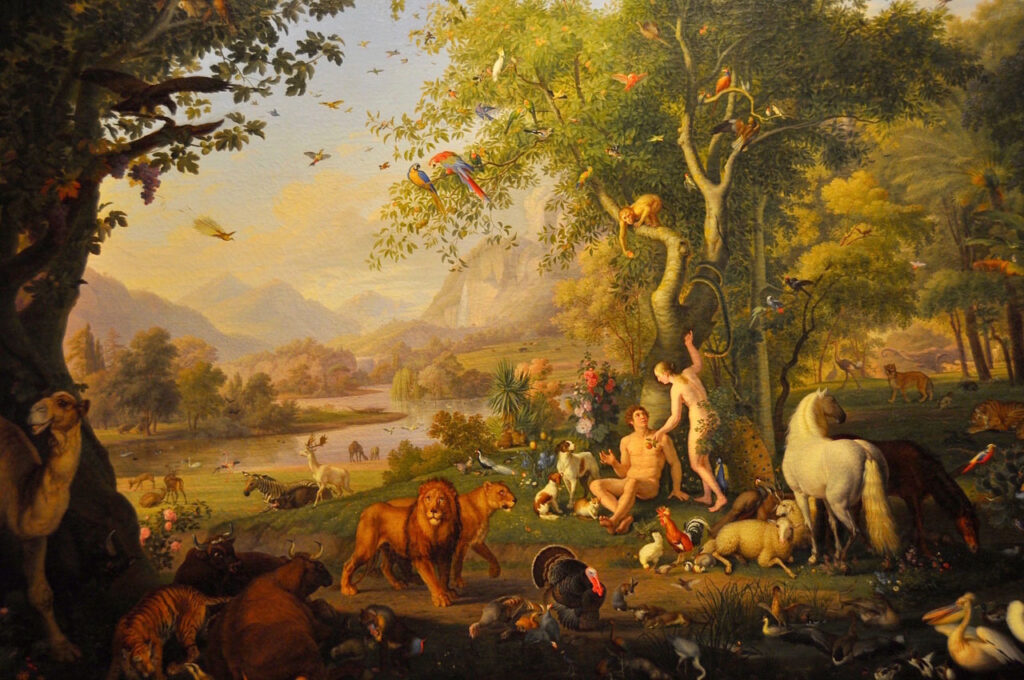
In this age of information overload, the ability to captivate people’s attention with a good story is an essential skill to develop to be heard in all the noise.
I have been fascinated by storytelling and telling stories ever since I first encountered Joseph Campbell’s PBS series on The Power of Myth when I was a teenager.
This thought-provoking series inspired me to read his book The Hero With A Thousand Faces, which documents the similarities between the different mythologies and storytelling traditions around the world.
In the book, he explores in great depth what he called the “Hero’s Journey”, an archetypal pattern of transformative storytelling that inspires has inspired humanity since the beginning of time and underpins most of our cultural mythologies.
It’s the story arc of the lives of religious prophets Jesus, Buddha, Lao Tzu, and Mohammed. It’s the plotline of blockbuster movies like Avatar, Star Wars, and The Matrix. It’s also found in popular books like Alice In Wonderland, Lord of the Rings, and the Harry Potter series.
The Hero’s Journey
In this age of attention deficit everything, you can learn how to better captivate attention by understanding the Hero’s Journey.
It can help you understand and tell your own hero’s journey while also boosting your leadership abilities by better inspiring and motivating others. The Hero’s Journey is a powerful narrative that guides us through the imaginal power of its archetypal story structure.
The Hero’s Journey applies in the digital age more than ever before. The modern world is in search of its human soul and people are desperate for more meaning, purpose, and empowerment in their lives.
To learn more about the Hero’s Journey in a wider context, watch this video about the power of story by Jonah Sachs who is the author of Winning The Story Wars and many viral videos such as The Story of Stuff.
Best Storytelling Quotes From Across The World:
If you want to improve your storytelling skills, here are some excellent storytelling quotes that may spark your curiosity and make you want to learn more about the power of storytelling.
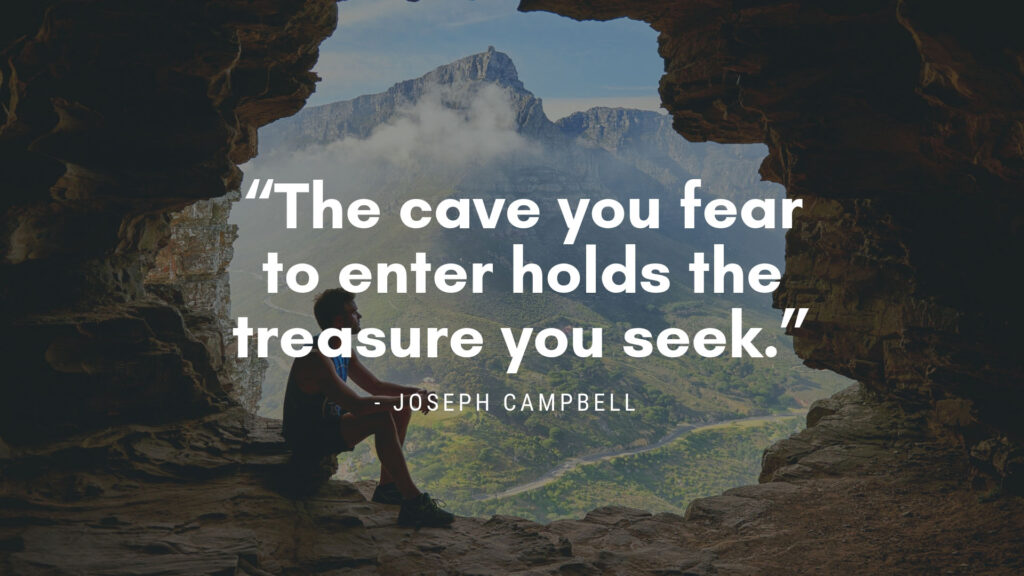
Joseph Campbell, author of The Hero With A Thousand Faces.
1. “The usual hero adventure begins with someone from whom something has been taken, or who feels there is something lacking in the normal experience available or permitted to the members of society. The person then takes off on a series of adventures beyond the ordinary, either to recover what has been lost or to discover some life-giving elixir. It’s usually a cycle, a coming and a returning.”
2. “People say that what we’re all seeking is a meaning for life. I don’t think that’s what we’re really seeking. I think that what we’re seeking is an experience of being alive, so that our life experiences on the purely physical plane will have resonances with our own innermost being and reality, so that we actually feel the rapture of being alive.”
3. “Furthermore, we have not even to risk the adventure alone; for the heroes of all time have one before us, the labyrinth is fully known; we have only to follow the thread of the hero-path. And where we had thought to find an abomination, we shall find a god; where we had thought to slay another, we shall slay ourselves; where we had thought to travel outward, we shall come to the center of our own existence; where we had thought to be alone, we shall be with all the world.”
4. “Follow your bliss. If you do follow your bliss, you put yourself on a kind of track that has been there all the while waiting for you, and the life you ought to be living is the one you are living. When you can see that, you begin to meet people who are in the field of your bliss, and they open the doors to you. I say, follow your bliss and don’t be afraid, and doors will open where you didn’t know they were going to be. If you follow your bliss, doors will open for you that wouldn’t have opened for anyone else.”
5. “The psychological dangers through which earlier generations were guided by the symbols and spiritual exercises of their mythological and religious inheritance, we today (in so far as we are unbelievers, or, if believers, in so far as our inherited beliefs fail to represent the real problems of contemporary life) must face alone, or, at best with only tentative, impromptu, and not often very effective guidance. This is our problem as modern, “enlightened” individuals, for whom all gods and devils have been rationalized out of existence.”
6. “It has always been the prime function of mythology and rite to supply the symbols that carry the human spirit forward, in counteraction to those that tend to tie it back.”
7. “If you’re going to have a story, have a big story, or none at all.”
8. “If the path before you is clear, you’re probably on someone else’s.”
9. “Mythology, in other words, is psychology misread as biography, history, and cosmology.”
10. “The ego is as you think of yourself. You in relation to all the commitments of your life, as you understand them. The self is the whole range of possibilities that you’ve never even thought of. And you’re stuck with your past when you’re stuck with the ego. Because if all you know about yourself is what you found out about yourself, well, that already happened. The self is a whole field of potentialities to come through.”
11. “The first step to the knowledge of the wonder and mystery of life is the recognition of the monstrous nature of the earthly human realm as well as its glory, the realization that this is just how it is and that it cannot and will not be changed. Those who think they know how the universe could have been had they created it, without pain, without sorrow, without time, without death, are unfit for illumination.”
12. “Half the people in the world think that the metaphors of their religious traditions, for example, are facts. And the other half contends that they are not facts at all. As a result we have people who consider themselves believers because they accept metaphors as facts, and we have others who classify themselves as atheists because they think religious metaphors are lies.”
13. “Find a place inside where there’s joy, and the joy will burn out the pain.”
14. “The way to find out about happiness is to keep your mind on those moments when you feel most happy, when you are really happy — not excited, not just thrilled, but deeply happy. This requires a little bit of self-analysis. What is it that makes you happy? Stay with it, no matter what people tell you. This is what is called following your bliss.”
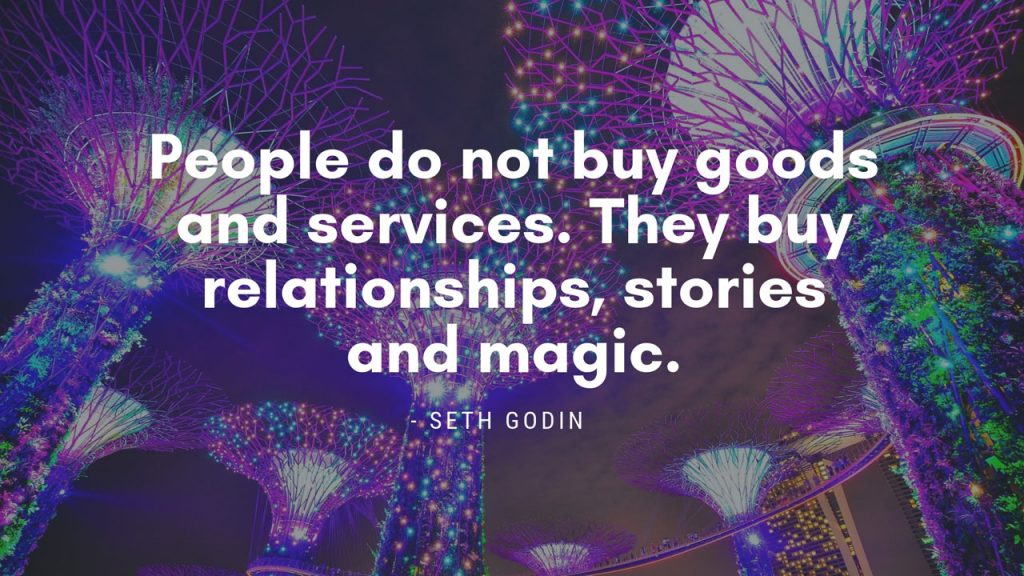
Seth Godin, author of Tribes: We Need You To Lead Us.
1. “The secret of leadership is simple: Do what you believe in. Paint a picture of the future. Go there. People will follow.”
2. “A tribe is a group of people connected to one another, connected to a leader, and connected to an idea. For millions of years, human beings have been part of one tribe or another. A group needs only two things to be a tribe: a shared interest and a way to communicate.”
3. “Remarkable visions and genuine insights are always met with resistance. And when you start to make progress, your efforts are met with even more resistance. Products, services, career paths – whatever it is, the forces for mediocrity will align to stop you, forgiving no errors and never backing down until it’s over. If it were any other way, it would be easy. And if it were any other way, everyone would do it and your work would ultimately be devalued. The yin and yang are clear: without people pushing against your quest to do something worth talking about, it’s unlikely to be worth the journey. Persist.”
4. “An individual artist needs only a thousand true fans in her tribe. It’s enough.”
5. “Marketing is no longer about the stuff you make, but about the stories you tell.”
6. “I think that while markets are conversations, marketing is a story. Starbucks creates conversations among customers, so does Apple. The NYSE makes a fortune permitting people to interact with each other. But great marketing is storytelling, and if you’ve been to a Broadway show lately, you’ll notice that audience participation is discouraged. That doesn’t mean that great playwrights don’t listen! They do. They, like great marketers, listen relentlessly. They engage in offline conversations constantly. They poll and they do censuses and most important, they have true conversations with small groups of real people. But THEN, they tell a story.”
7. “A great story is true. Not necessarily because it’s factual, but because it’s consistent and authentic.
8. I think most people have it upside down. Being charismatic doesn’t make you a leader. Being a leader makes you charismatic.”
9. “People want to know how to be sure they get credit for an idea. Real leaders don’t care. If it’s about your mission, about spreading the faith, about seeing something happen, not only do you not care about credit, you actually want other people to take credit.”
10. “Life’s too short” is repeated often enough to be a cliche, but this time it’s true. You don’t have enough time to be both unhappy and mediocre. It’s not just pointless, it’s painful. Instead of wondering when your next vacation is, maybe you ought to set up a life you don’t need to escape from.”
11. “Many people are starting to realize that they work a lot and that working on stuff they believe in (and making things happen) is much more satisfying then just getting a paycheck and waiting to get fired (or die).”
12. “Great leaders don’t water down their message in order to make the tribe a bit bigger. Instead, they realize that a motivated, connected tribe in the midst of a movement is far more powerful than a larger group could ever be.”
13. “A brand is the set of expectations, memories, stories and relationships that, taken together, account for a consumer’s decision to choose one product or service over another.”
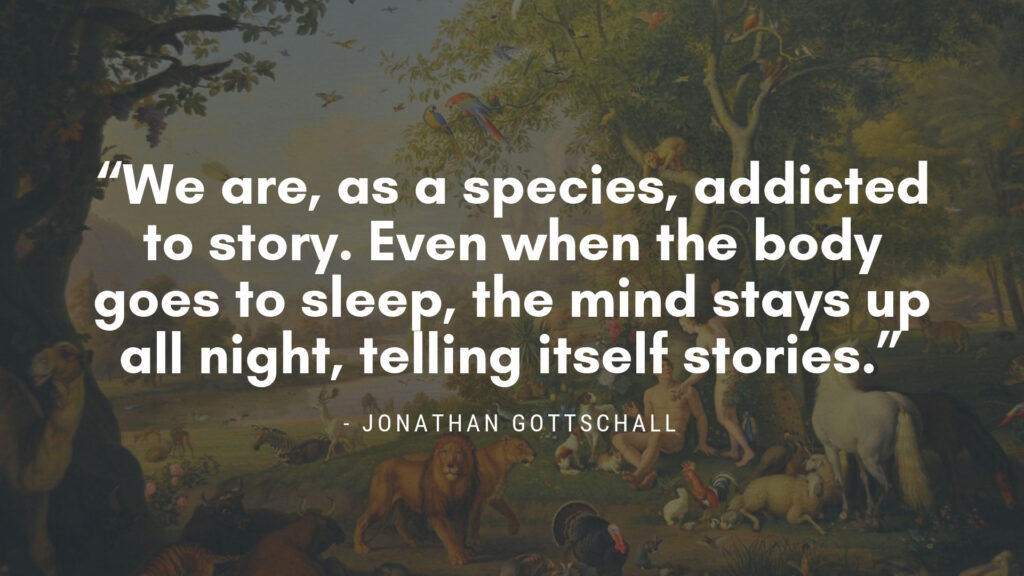
Jonathan Gottschall, author of The Storytelling Animal: How Stories Make Us Human.
1. “Story—sacred and profane—is perhaps the main cohering force in human life. A society is composed of fractious people with different personalities, goals, and agendas. What connects us beyond our kinship ties? Story. As John Gardner puts it, fiction “is essentially serious and beneficial, a game played against chaos and death, against entropy.” Story is the counterforce to social disorder, the tendency of things to fall apart. Story is the center without which the rest cannot hold.”
2. “The storytelling mind is allergic to uncertainty, randomness, and coincidence. It is addicted to meaning. If the storytelling mind cannot find meaningful patterns in the world, it will try to impose them. In short, the storytelling mind is a factory that churns out true stories when it can, but will manufacture lies when it can’t.”
3. “Commentators frequently blame MMORPGs for an increasing sense of isolation in modern life. But virtual worlds are less a cause of that isolation than a response to it. Virtual worlds give back what has been scooped out of modern life. The virtual world is in important ways more authentically human than the real world. It gives us back community, a feeling of competence, and a sense of being an important person whom people depend on.”
4 “As the video game designer and writer James Wallis puts it, “Human beings like stories. Our brains have a natural affinity not only for enjoying narratives and learning from them but also for creating them. In the same way that your mind sees an abstract pattern and resolves it into a face, your imagination sees a pattern of events and resolves it into a story.”
5. “When we read nonfiction, we read with our shields up. We are critical and skeptical. But when we are absorbed in a story, we drop our intellectual guard. We are moved emotionally, and this seems to leave us defenseless. ”
6. “Like any published memoir, our own life stories should also come with a disclaimer: “This story that I tell about myself is only based on a true story. I am in large part a figment of my own yearning imagination.” And it’s a good thing, too. As we will see, a life story is an intensely useful fiction.”
7. “Why do stories cluster around a few big themes, and why do they hew so closely to problem structure? Why are stories this way instead of all the other ways they could be? I think that problem structure reveals a major function of storytelling. It suggests that the human mind was shaped for story, so that it could be shaped by story.”
8. “The idea that stories slavishly obey deep structural patterns seems at first vaguely depressing. But it shouldn’t be. Think of the human face. The fact that all faces are very much alike doesn’t make the face boring or mean that particular faces can’t startle us with their beauty or distinctiveness.”
9. “Fiction is an ancient virtual reality technology that specializes in simulating human problems.”
10. “Story = Character + Predicament + Attempted Extrication”
11. “There is very little difference between one man and another; but what little there is, is very important.”
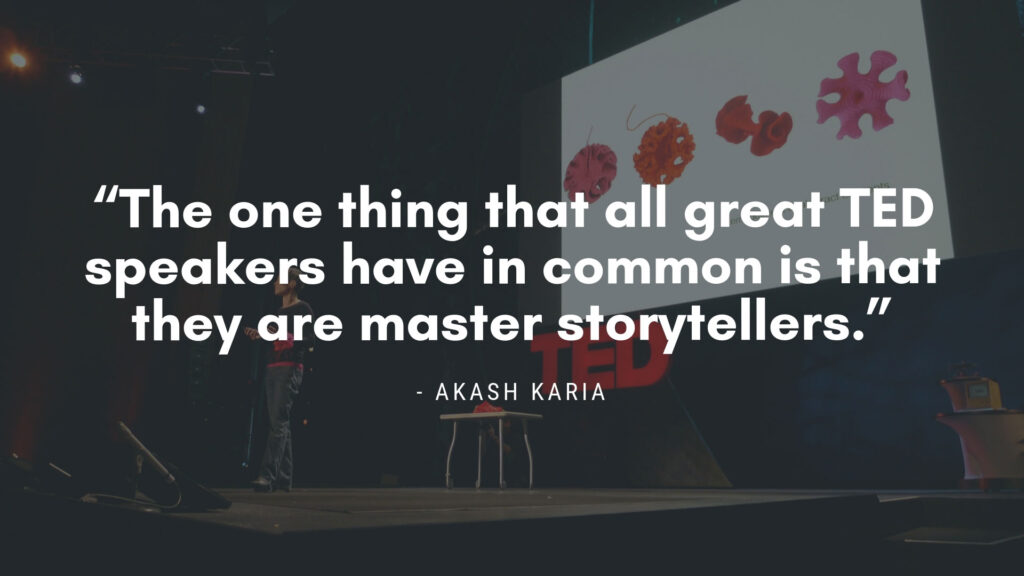
Akash Karia, author of TED Talks Storytelling
1. “The number one thing that makes a story irresistible – that has audience members sitting on the edge of their seats, totally captivated by your every word – is conflict. What do I mean by conflict? Conflict refers to a fight. It’s a fight between opposing forces. A fight between life and death. A fight between hate and forgiveness. A fight between freedom and oppression. As long as there are two strong, opposing forces that make the outcome of the story uncertain, a story will be gripping. It keeps us engaged. It keeps us curious. It makes us ask the question, “What will happen next?”
2. “Share a personal story. The surprising element that makes a story irresistible is conflict. The stronger the conflict, the more captivating your story will be. Ask yourself, “Is the conflict in my story strong enough? Does it arouse the audience’s emotions?” The conflict in a story is what keeps your audience curious. The conflict is what makes the audience ask, “What will happen next?” No conflict = no curiosity = no interest.”
3. “Analyzing the effect a presentation has on you is a fantastic way to learn what works and what doesn’t when it comes to public speaking. If you don’t grab your audience’s attention within the first thirty seconds, your audience will mentally tune out of your presentation. Don’t bore your audience with introductory remarks. Begin with a story. Stories are powerful because people are hardwired to listen to stories. Stories take your audience on a mental journey. Audiences cannot resist a well-told story even if they try.”
4. “People are hardwired to listen to stories. Stories are the way human knowledge was passed down before the written word. Storytelling is hardwired into our brains. It’s the natural way that our brains learn and process information.”
5. “If I could leave my audience with only one single key takeaway message, what would it be? If my audience was to forget everything else I said, what one single idea or lesson would I want them to remember?”
6. “The one thing that all great TED speakers have in common is that they are master storytellers.”
7. “Dialogue is more powerful than narration. It puts audience members into the scene, allowing them to hear exactly what was said. Dialogue is also shorter and punchier than narration. Finally, another advantage of dialogue is that it allows you to use vocal variety – to slightly change the pace, pitch and volume of your voice to reflect the emotions and speech of the different characters in your speech. As a result, your delivery will be more dynamic and engaging. When delivering your story, always use dialogue – not narration.”
8. “The Starfish story – the one where a man walking along the beach sees a young boy throwing starfishes back into the ocean. When the man tells the boy, “Why bother? There are so many starfishes you can’t possibly make a difference,” the boy picks up a starfish, throws it back into the ocean and says, “To that one, I made a difference.”
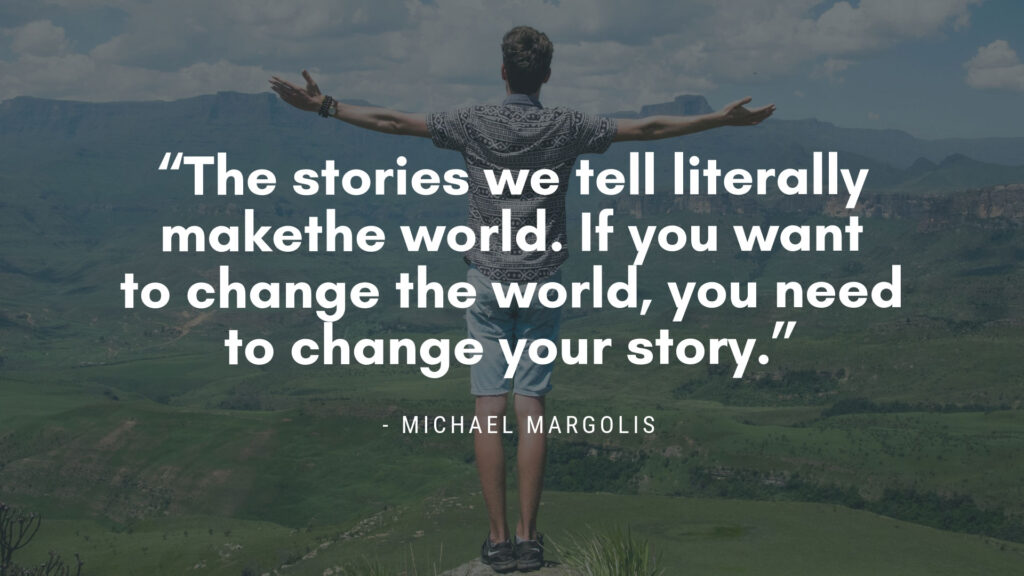
Michael Margolis, author of Believe Me
1. “The stories we tell literally make the world. If you want to change the world, you need to change your story. This truth applies both to individuals and institutions.”
2. “We all will experience pain, struggle, and trauma; suffering is a choice to cling and remain attached to the story.”
3. Your greatest achievement will always be your life’s story.
4. If you’re not telling your story, somebody is telling it for you.
5. If you want to learn about a culture, listen to the stories. If you want to change a culture, change the stories.
6. “Leaders lead by telling stories that give others permission to lead, not follow.”
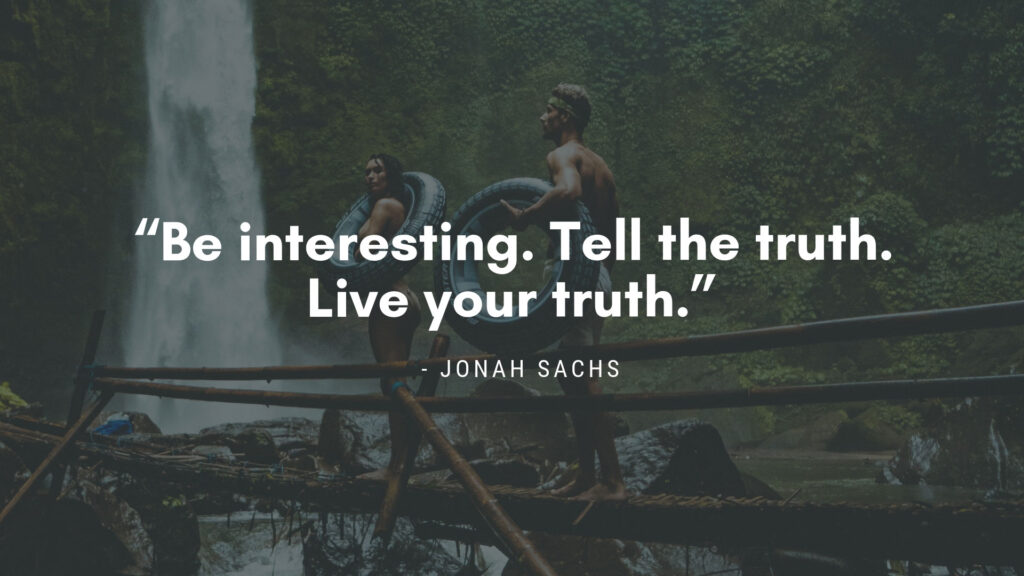
Jonah Sachs, author of Winning The Story Wars
1. “Using Maslow’s insights, you can define higher-level values appropriate to your message, brand, and audience. Then, using what we learn from Joseph Campbell, you can turn those values into a resonant moral of the story and create a story structure that will appeal to the heroic potential in your audiences. These models show us a clear alternative to the dark, limited view of human nature inspired by Freud and brought to the marketplace by men like Edward Bernays.”
2. “Empowerment marketing: stories told to help encourage audiences on their path to maturation and citizenship. The practice of empowerment marketing is based on two of the most influential theories in the field of human growth and maturation—Abraham Maslow’s hierarchy of needs and Joseph Campbell’s hero’s journey.”
3. “Be interesting. Tell the truth. And if you can’t tell the truth, change what you’re doing so you can. In other words, live the truth.”
4. “Start with your audiences and their needs, then introduce yourself as a catalyst for helping them meet those needs, and a story instantly begins to unfold: Multiple characters and, most importantly, your audiences in a starring role. Conflict between your audience’s desires and their current state. And a plot or journey that you invite them to join you on to reach those desires.”
5. “Orient your entire brand toward storytelling by defining and defending a powerful moral of your story in every communication.”
6. “We live in a world that has lost its connection to its traditional myths, and we are now trying to find new ones—we’re people, and that’s what people without myths do. These myths will shape our future, how we live, what we do, and what we buy. They will touch all of us. But not all of us get to write them. Those who do have tremendous power.”
7. “Vanity sets in when you love what you’re selling so much that you assume everyone else will too. You start to believe your idea will sell itself if you can just reach out and tell people about it. You’re wrong.”
8. “Stories that allow people to access and express their own inner truths—what could be a more powerful tool for creating evangelists in our post-broadcast world?”
9. So what makes a good story? Here’s a simple story test:
Tangible: “Does your communication provide a who, what, where, and when?” Relatable: “Do you find that you can identify with – or are in emotional opposition to – the characters in your communication because you understand what motivates them?”
Immersive: “Can you learn something of value for your own life from the character’s experience?
Memorable: “Does your communication leave you with a lasting image – transmitted either in pictures or in text – that can be easily recalled and reminds you of the core message?”
Emotional: “Does your communication make you feel something rather than just think something?”
10. “Vanity sets in when you love what you’re selling so much that you assume everyone else will too. You start to believe your idea will sell itself if you can just reach out and tell people about it. You’re wrong.”
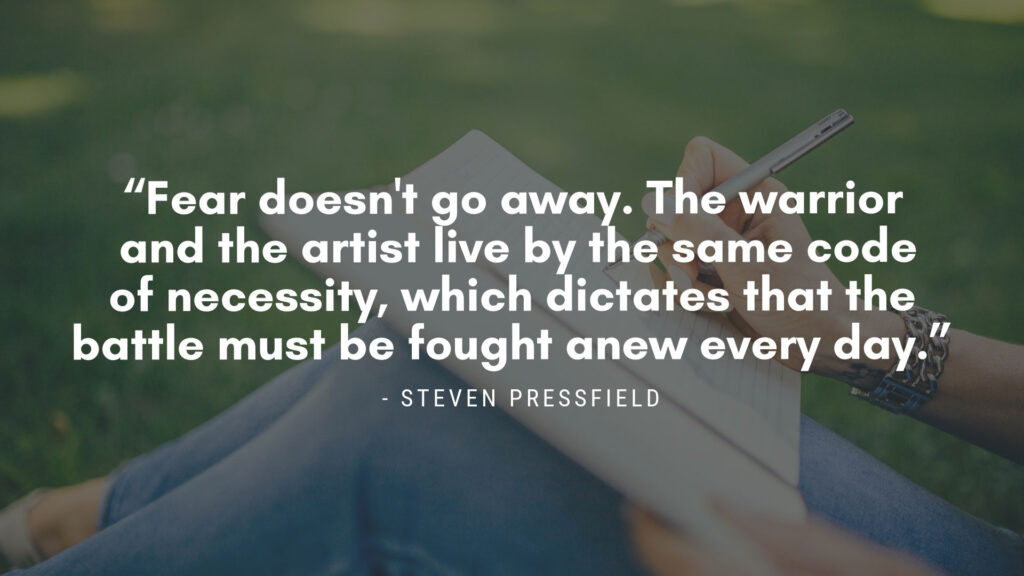
Steven Pressfield in The War of Art
1. “If you find yourself asking yourself (and your friends), “Am I really a writer? Am I really an artist?” chances are you are. The counterfeit innovator is wildly self-confident. The real one is scared to death.”
2. “Are you paralyzed with fear? That’s a good sign. Fear is good. Like self-doubt, fear is an indicator. Fear tells us what we have to do. Remember one rule of thumb: the more scared we are of a work or calling, the more sure we can be that we have to do it.”
3. “Our job in this life is not to shape ourselves into some ideal we imagine we ought to be, but to find out who we already are and become it.”
4. “The artist committing himself to his calling has volunteered for hell, whether he knows it or not. He will be dining for the duration on a diet of isolation, rejection, self-doubt, despair, ridicule, contempt, and humiliation.”
5. “Fear doesn’t go away. The warrior and the artist live by the same code of necessity, which dictates that the battle must be fought anew every day.”
6. “Someone once asked Somerset Maughham if he wrote on a schedule or only when struck by inspiration. “I write only when inspiration strikes,” he replied. “Fortunately it strikes every morning at nine o’clock sharp.”
7. “Rule of thumb: The more important a call or action is to our soul’s evolution, the Resistance we will feel toward pursuing it.”
. “The professional learns to recognize envy-driven criticism and to take it for what it is: the supreme compliment. The critic hates most that which he would have done himself if he had had the guts.”
9. “The sign of the amateur is overglorification of and preoccupation with the mystery. The professional shuts up. She doesn’t talk about it. She does her work.”
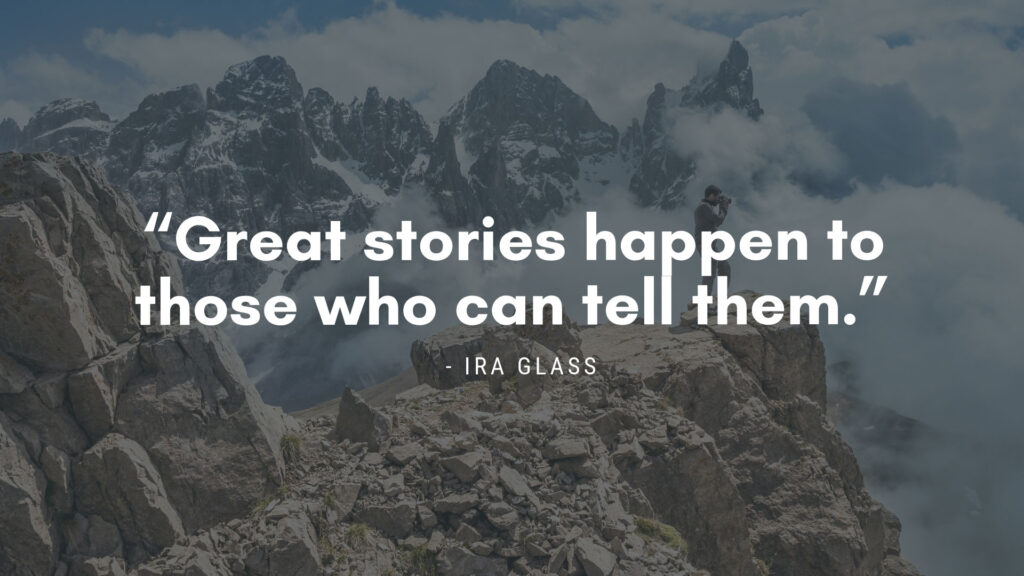
More Extraordinary Storytelling Quotes:
Some other of the best inspiring storytelling quotes that I’ve collected in my Notion in the last few years.
1. Either write something worth reading or do something worth writing about. – Benjamin Franklin
2. “The basic rule of storytelling is ‘show, don’t tell.’” – Julianna Baggott
3. “The engineers of the future will be poets.” – Terence McKenna
4. “The human species thinks in metaphors and learns through stories.” – Mary Catherine Bateson
5. “Those who tell the stories rule the world.” – Hopi American Indian proverb
6. “There’s always room for a story that can transport people to another place.” – J.K. Rowling
7. “Storytelling is the most powerful way to put ideas into the world today.” – Robert McKee
8. “Tell me the facts and I’ll learn. Tell me the truth and I’ll believe. But tell me a story and it will live in heart forever.” – Native American Proverb
9. “If history were taught in the form of stories, it would never be forgotten.”– Rudyard Kipling, English short-story writer, poet and novelist
10. “We cannot create a world we can’t imagine and stories are the engines of our imaginations.” – Josh Stearns
11. That’s what storytellers do. We restore order with imagination. We instill hope again and again.” – Walt Disney in Saving Mr. Banks
12. Storytelling is the mother of all ‘pull’ marketing strategies. It encourages dialogue, engagement and interaction among equals – an exchange of meaning between people. Yet many companies and brands are still relentlessly pushing messages out, hoping that with enough repetition, something will stick.” – Bill Baker, principal of BB&Co Strategic Storytelling
13. “The fact of storytelling hints at a fundamental human unease, hints at human imperfection. Where there is perfection there is no story to tell.” – Ben Okri, Nigerian poet and novelist
14. “After nourishment, shelter and companionship, stories are the thing we need most in the world.” – Philip Pullman, best-selling British author
15. “Every great love starts with a great story…” – Nicholas Sparks, American writer and novelist, in The Notebook
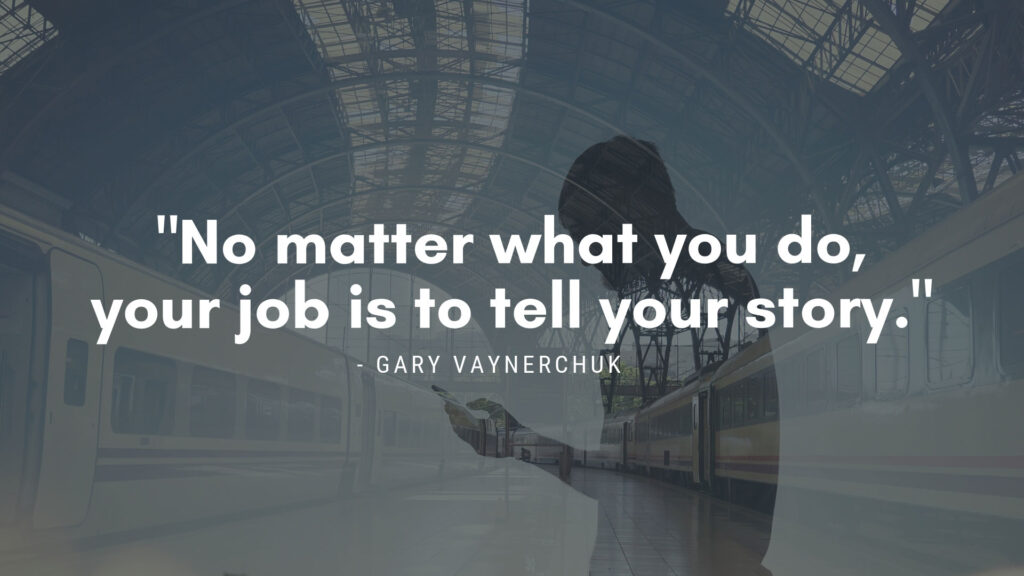
16. “Sometimes reality is too complex. Stories give it form.” – Jean Luc Godard
17. “Tell me the facts and I’ll learn. Tell me the truth and I’ll believe. But tell me a story and it will live in my heart forever.” – Native American Proverb
18. “Story is a yearning meeting an obstacle.” – Robert Olen Butler
19. “Storytelling reveals meaning without committing the error of defining it.” – Hannah Arendt
20. “There is no greater agony than bearing an untold story inside you.” – Maya Angelou
21. “65% of conversations consists of stories. When we want to communicate important information, we tell a story.” – Jeremy Hsu
22. “It has been said that next to hunger and thirst, our most basic human need is for storytelling.” – Khalil Gibran
23. “You’re never going to kill storytelling, because it’s built in the human plan. We come with it.” – Margaret Atwood
24. “There is no greater agony than bearing an untold story inside you.” – Maya Angelou
25. “Story, as it turns out, was crucial to our evolution — more so than opposable thumbs. Opposable thumbs let us hang on; story told us what to hang on to.” – Lisa Cron
26. “The purpose of a storyteller is not to tell you how to think, but to give you questions to think upon.” – Brandon Sanderson
27 “People think that stories are shaped by people. In fact, it’s the other way around.” – Terry Pratchett
28. “In learning the art of storytelling by animation, I have discovered that language has an anatomy. – Walt Disney
29. “If history were taught in the form of stories, it would never be forgotten.” – Rudyard Kipling
30. “Stories are powerful because they transport us into other people’s worlds but in doing that they change the way our brains work, and potentially change our brain chemistry — and that’s what it means to be a social creature.” – Paul J. Zak
31. “Storytelling is the oldest form of education.” – Terry Tempest Williams
32. “If you want your children to be intelligent, read them fairy tales.” – Albert Einstein
33. “The most powerful person in the world is the storyteller. The storyteller sets the vision, values and agenda of an entire generation that is to come.” – Steve Jobs.
34. “Ever since I started in business I have been fascinated by the intersection of entrepreneurship and storytelling.” – Richard Branson
35. “To make our communications more effective, we need to shift our thinking from “What information do I need to convey?” to “What questions do I want my audience to ask?” – Chip Heath
36. “The audience does not need to tune themselves to you—you need to tune your message to them. Skilled presenting requires you to understand their hearts and minds and create a message to resonate with what’s already there.” – Nancy Duarte
37. “People have forgotten how to tell a story. Stories don’t have a middle or an end any more. They usually have a beginning that never stops beginning.” – Steven Spielberg
38. “Those who do not have power over the story that dominates their lives-the power to retell it, rethink it, deconstruct it, joke about it, and change it as times change – truly are powerless, because they cannot think new thoughts.” – Salmon Rushdie
39. “Stories are the creative conversion of life itself into a more powerful, clearer, more meaningful experience. They are the currency of human contact.” – Robert McKee
40. “The universe is made of stories, not atoms.” – Muriel Rukeyser
41. We are our stories. We compress years of experience, thought and emotion into a few compact narratives and that we convey to others and tell to ourselves. That has always been true. But personal narrative has become more prevalent, and perhaps more urgent, in a time of abundance, when many of us are freer to seek a deeper understanding of ourselves and our purpose.” – Daniel Pink
42. “In a time of rapidly compounding technology generations, the most successful businesses will consistently deliver high touch to customers with one of out oldest traits… the telling of a story.” – Jim Blasingame
43. “It’s like everyone tells a story about themselves inside their own head. Always. All the time. That story makes you what you are. We build ourselves out of that story.” – Patrick Rothfuss
44. “You’re never going to kill storytelling because it’s built into the human plan. We come with it.” – Margaret Atwood
45. “The future belongs to a different kind of person with a different kind of mind: artists, inventors, storytellers-creative and holistic ‘right-brain’ thinkers.” – Daniel Pink
46. “The stories we tell literally make the world. If you want to change the world, you need to change your story. This truth applies both to individuals and institutions.” – Michael Margolis
47. “Community is formed only by shared stories, not by monologues. Empathic listening is followed, in time by reciprocal storytelling. I know I have a place in the community not only as I hear and accept its stories but as it hears and makes room for mine.” – Daniel Taylor
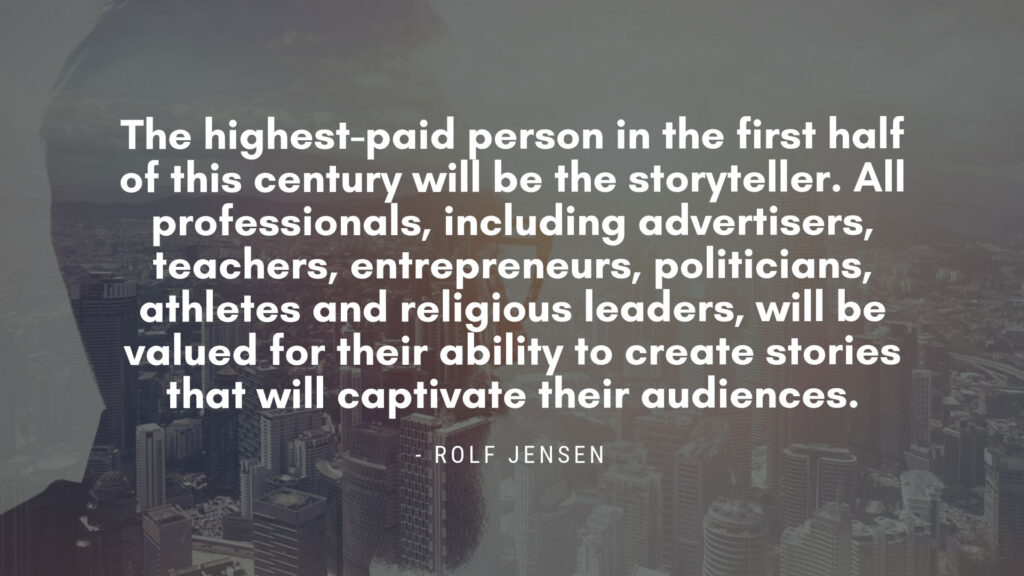
And last but not least, some 21st-century wisdom from Rolf Jensen, former director of the Copenhagen Institute for Future Studies.
If you enjoyed these storytelling quotes, please share this storytelling wisdom with someone you think it would inspire.



